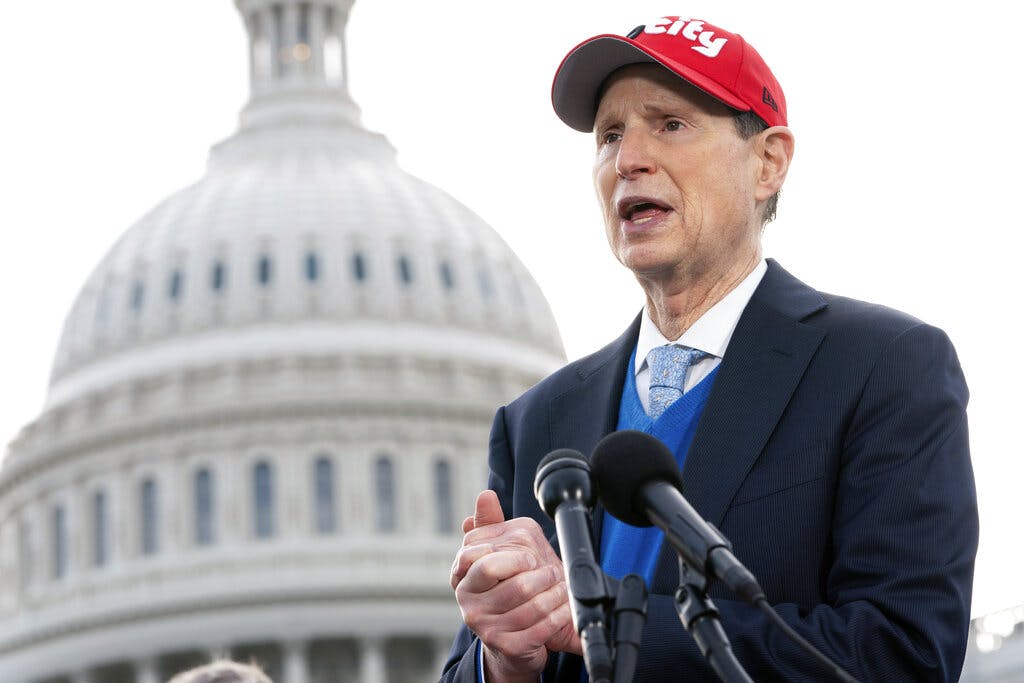As Biden Asks for More Production, Wyden Unveils Plan To Tax ‘Excess’ Gas Profits
Critics argue that if enacted, this added tax and other Democratic proposals could cause prices to spike further.

Senator Wyden of Oregon will pursue a proposal for a new “windfall tax” on oil companies that is intended to combat rising energy costs. Critics argue that this added tax and other Democratic proposals could cause prices to spike further.
Mr. Wyden’s proposal comes as President Biden has called on the oil and gas industry to increase production in an effort to hold prices down, announcing plans for an “emergency meeting” with companies to tackle the crisis.
Mr. Wyden argues that the inflation of oil prices has been worsened by “price gouging,” as the industry reaps record profits.
His proposal would raise taxes on companies deemed to have brought in “excess” profits. It would levy a tax of 21 percent on every dollar a company makes after reaching 10 percent net profit. It would apply to companies earning more than $1 billion annually.
The surtax would be added to the already existing 21 percent corporate tax rate.
“While Americans are paying through the nose at the gas pump,” Mr. Wyden tweeted Wednesday, “Big Oil is raking in record profits, rewarding their CEOs and shareholders with stock buybacks, and using special tax loopholes to dodge paying taxes.”
Mr. Wyden also unveiled a plan to levy a 25 percent tax on profits from stock buybacks and proposed eliminating an accounting benefit that would have allowed companies worth more than $1 billion to receive a tax break in 2023.
He says the added tax would curtail the “perverse incentives” that encourage oil companies to raise prices.
Mr. Wyden’s plan is similar to a program introduced last month by the U.K. government to bring down gas prices. That program uses a temporary 25-percent windfall tax on gas profits to fund rebates for consumer energy bills.
Democrats have mulled passing a similar rebate for consumers struggling with high gas prices. In March, Representatives Mike Thompson, Lauren Underwood, and John Larson introduced a bill to give a $100 tax rebate to Americans making less than $75,000 during any month in which the average cost of gas exceeds $4.
Democrats have acknowledged, however, that the measure has little chance of becoming law.
“That’s not happening,” Representative Kurt Schrader of Oregon told Roll Call. “It’s just unrealistic. I mean, we can’t afford to do all that sort of thing at this point in time. It’s pandering. Let’s be smart.”
Some critics argue that such measures could lead to the opposite of their intended effects.
A researcher at the right-leaning Tax Foundation, Jared Walczak, has raised concerns about policies that intend to help consumers through short-term consumer price inflation spikes.
“Tax rebates, gas tax holidays, and other temporary tax expedients,” Mr. Walczak says, “have the potential to add to existing inflationary pressures while doing relatively little to help those in need.”
He points out that a similar rebate, issued by the Bush administration in 2001, led between 25 percent and 30 percent of consumers to spend more money, according to a study from the University of Chicago. Mr. Walczak fears that similar “demand-side” pressures for limited gas could spike prices further.
The American Petroleum Institute, which represents the interests of the oil and gas industry, also refuted Mr. Wyden’s plan, in a letter sent to Mr. Biden on Tuesday.
“Imposing new taxes on our industry will do the exact opposite and only discourage investment at a time when it’s needed most,” the API letter said, according to the New York Post.
Mr. Wyden’s new proposal is part of an effort by Democrats to brand the oil and gas industry as responsible for the rise in fuel prices. As Mr. Biden deals with the political fallout of $5 gas, he has ramped up attacks on the industry.
According to the Guardian, 2022 has been a record year for profits in the oil and gas industry. British Petroleum recorded its highest first-quarter profits in a decade. Shell and Exxon tripled theirs, while Chevron’s nearly quadrupled.
“Exxon made more money than God this year,” Mr. Biden said in comments last Friday about consumer price inflation.
Mr. Biden has called on oil producers to take “immediate actions” to increase supply in an effort to drive down costs.
“They have 9,000 permits to drill,” Mr. Biden has said. “Why aren’t they drilling? Because they make more money not producing more oil.”
Mr. Biden was referring to the 9,173 permits approved in 2021 by the Bureau of Land Management that have not been used.
The API disputes that this is a cause for the rise in gas prices.
“There are currently nearly 100,000 producing wells on federal lands,” the organization’s vice president of government relations, Lem Smith, said. “The 9,000 permits awaiting a process to start exploration or future production are a small fraction of the overall federal well count.”
“My administration is prepared to use all reasonable and appropriate federal government tools and emergency authorities to increase refinery capacity and output in the near term,” Mr. Biden said in a letter to the country’s seven largest oil companies, released on Tuesday.
Mr. Biden also said he will soon be meeting with an organization representing the interests of the oil and gas industry, the National Petroleum Council.
He directed companies to prepare “an explanation of any reduction in your refining capacity since 2020 and any concrete ideas that would address the immediate inventory, price, and refining capacity issues in the coming months.”

